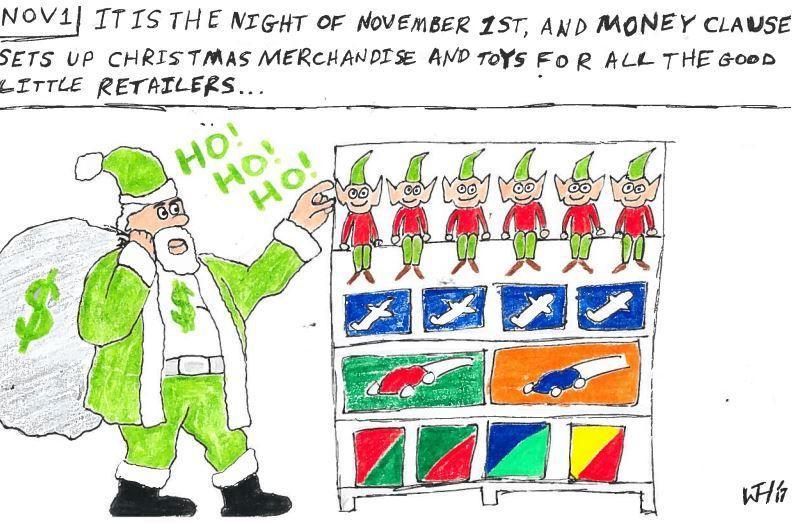Americans will spend $465 billion on Christmas shopping this year, according to the National Retail Federation. The day after Halloween, many retailers will string up lights, set up trees and leave out Thanksgiving. To corporations, the only seasons that matter are the ones that bring in the most money, and they decide how soon those seasons start. Understandably, it is their job to sell as many products as possible. However, by using Christmas as a tool to garner more wealth, companies’ commercialism cheapens one of the happiest seasons.
This commercialization is not new. In fact, the Christmas we think of today is almost entirely based off of advertisements and financially-driven marketing. Even the stereotypical Santa Claus is propaganda created by a soda company. Because the original white-bearded saint was unappealing to audiences, Coca-Cola hired an artist to redesign a more jolly Santa Claus for their advertisements. Thus the fuzzy red cap and coat were created to sell sugary sodas. Almost every aspect we consider part of the Christmas season has been carefully designed by men in suits deciding how best to steal your money.
A quick walk down greeting card aisle will show just how expected and expensive sending a friend a kitsch piece of paper can be. The appreciation and desire for sentimental, handwritten cards has fallen victim to kittens wearing elf hats. Because of this expectation, Christmas cards account for 25 percent of greeting card sales, or two billion dollars a year. The earlier stores push Christmas, the more cards customers will feel forced to purchase for their long-lost uncle.
Unfortunately for companies, customers hardly buy Thanksgiving paraphernalia. This means that for all intents and purposes, Thanksgiving does not exist. In almost every retail store, the “Elf on the Shelf” and every other iconic Christmas product appears far before families carve their turkeys. Though it brings about less purchases, Thanksgiving is an important holiday to remember in our nation. As a country of mostly consumers, we need this holiday to take a breather and reflect on everything there is to be thankful for.
Instead, retailers force this celebration out of our minds with garland, pseudo-snow, and Christmas tunes. While we should be giving thanks, customers are consumed with Black Friday, the day after Thanksgiving. Having a commercial holiday so soon after Thanksgiving cheapens the atmosphere we are supposed to create. It is impossible to be grateful when people are so focused on what they want and how cheap they can get it the very next day. In fact, 19.2 percent of retail industries’ total sales came from the holiday season in 2013. There is far more desire than thanks.
Even though there are no Thanksgiving decorations or carols, do not forget the upcoming holiday. It is necessary to reflect on what you already have to be grateful for. Without thanks, people devolve into animals of desire. A Christmas wish list can wait, but it is never too soon to write a thank you card.
Ethan Gilberti is a 19-year-old English sophomore from New Orleans, Louisiana.
Opinion: Thanksgiving loses its spotlight to Christmas
November 7, 2017








